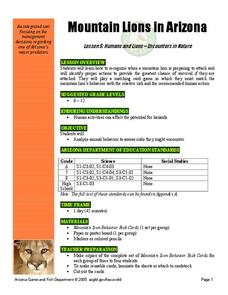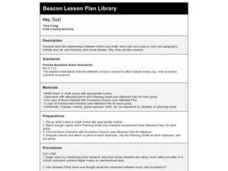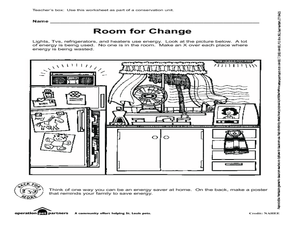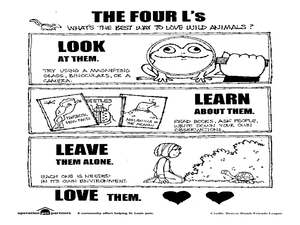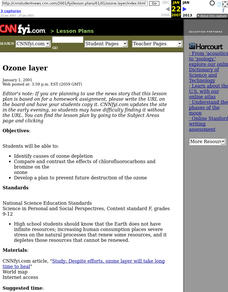Habitat Conservation Trust Foundation
Greenhouse Gas Game
You will need to gather a number of tokens, bags, and other various game components in order to incorporate this activity into your curriculum. Different tokens represent carbon dioxide, methane, and nitrous oxide. Printable 8.5"x11"...
Water
Global Water Supply Elementary School Curriculum
Water is the focus of an interdisciplinary unit that brings awareness to its daily use around the world and the importance of conservation. Worksheets challenge scholars to match words and definitions, trace, complete a maze, and solve a...
Lee & Low Books
First Come the Zebra Teacher’s Guide
Accompany a reading of First Come the Zebra written and illustrated by Lynne Barasch with a teacher's guide equipped with before reading, vocabulary, and after reading activities. Additional social studies, science, music, art, math, and...
Michigan Sea Grant
Environmental Decision Making
Pupils participate in a board game activity in which landing on a space called "Decision Card" presents them with a land-use situation to consider and decide how to act. In order to advance in Hydropoly, players must think critically and...
Curated OER
What is Economics? An Economic Board Game
Learners learn the fundamental concepts of economics as it relates to government.
Curated OER
The MPA “GamePlan”
Eighth graders explore the purpose of having Marine Protected Areas. In this environmental science lesson, 8th graders simulate the planning process by playing a board game. They explain the positive and negative effects of trade offs.
Teach Engineering
The Energy Problem
Think you can solve the energy problem? You'll first need to know about current energy use. Analyzing a set of circle graphs lets scholars see where energy consumption is the greatest, both by sector and by household use. They develop a...
Curated OER
The Answer Is- What Is the Question
Students review subject matter using a game format. In this quiz game lesson plan, students work in small groups or teams to state the question that matches the answer given by the teacher. (This is similar to the game of Jeopardy) They...
Curated OER
Mountain Lions in Arizona Lesson 5: Humans and Lions - Encounters in Nature
Fledgling felinologists are taught how to recognize when a mountain lion is preparing to attack. They identify proper actions to provide the greatest chance of survival if they are attacked. Learners play a matching card game in which...
Curated OER
Hey, Cuz!
Third graders examine the relationships between rhythm and math, tone color and science, form and geography, melody and art, and harmony and social studies. Why, they are like cousins! Students, in groups, present projects demonstrating...
Curated OER
Save the Earth, it's Everyone's Home!
Young scholars examine trash for items to recycle and reuse. For this trash lesson, students explore how people in the community can use recycled and reused items as they play a recycling game.
Curated OER
The Atrazine Dilemma
Students understand how farming practices and the topography of a region can effect the health and safety of all living things. Students play a game which helps them understand how the chemical Azatrine has spread in the watershed.
Curated OER
Wonderfully Wild Unit the four L's of Wildlife
Students appreciate the natural environment. In this "four L's" lesson, students observe, reflect and appreciate unique ecosystems and how they help sustain life. Students create posters with the four L's.
Curated OER
Ozone Layer
High schoolers read a CNNfyi.com article in order to identify causes of ozone depletion. They compare and contrast the effects of chlorofluorocarbons and bromine on the ozone. They develop a plan to prevent future destruction of the ozone.










